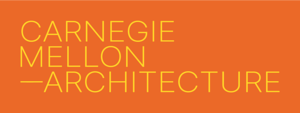4919 Frew Street
Pittsburgh, Pennsylvania 15213
United States
After conducting an international search, Carnegie Mellon Architecture is pleased to announce Tuliza Sindi as the new Curator for Public Programs and Director of Publications. Tuliza is a South African architecture educator, researcher, practitioner and curator. She founded the graduate design-research studio Unit 19 (2020–22) at the University of Johannesburg’s Graduate School of Architecture (GSA) and most recently held the 2023-25 Ann Kalla Professorship in Architecture at Carnegie Mellon Architecture.
In 2022, she co-founded cross-disciplinary architecture collective room19isaFactory. with three Unit 19 graduates. Through the practice she terms “Unreasonable Architecture,” she explores ways to suspend design approaches to “land” as defined by the cosmologies of modern reason, chronopolitics and property regimes, through the view of architecture as cosmological wall-making.
As Curator for Public Programs and Director of Publications at Carnegie Mellon Architecture, Tuliza will plan and execute the school’s annual Public Programs series in collaboration with faculty, staff and students. She will also be responsible for the EX-CHANGE publication and exhibition, an annual event that highlights the work of students across our programs. Finally, Tuliza will develop publications that share the school’s research and student work more widely and will lead the discourse in areas related to our schools pedagogical focus on climate change, artificial intelligence and social justice.
In her new role, Tuliza aims not just to position Carnegie Mellon Architecture as a contributor to architectural discourse, but as a meaningful instigator of ideas and futures, to move towards carving new trajectories for the discipline that respond to the most prescient societal challenges of our time.
Tuliza sees the school’s public programs and publications infrastructure as having the dynamic capacity to adapt to meet any global or local moment, as it sits as a mediator unconstrained by the mandates of curricula or practice. “The vehicle affords Carnegie Mellon Architecture the capacity for radical discursive and polemic pursuit, where rich historical and theoretical groundwork can be set, groundbreaking methods can be uncovered, declared, interrogated and incubated through interdisciplinary means, and where innovative practitioners and firms can be platformed in efforts to introduce a new generation of pioneers and radical thinkers.”
Tuliza’s experience and exposure spans across several geographies, some of which include Mozambique, Sweden, Brazil, France, England, Cape Verde, Namibia, Ethiopia, Israel, the United States and Ghana. Through her experience, she hopes to drive a vision towards a globally relevant and discursive public programs and publications framework that can help move the discipline into its new directions.
“As the birthplace of artificial intelligence and an ongoing contributor to warfare intelligence technologies, Carnegie Mellon University fills a complex but intellectually productive role in the collective consciousness of the US and the world,” Tuliza outlines. “Ideas of ‘intelligence’ remain rooted in politicized meaning, as its definitional foundations paved the view of the modern world and its racialized participants through determinations of which humans have the capacity for modern reason (i.e., humanitas) and which do not (i.e., anthropos, or approximating to human). As we see ideas of intelligence continually ascribed to inanimate objects, it resurfaces ongoing questions around what and who is human, and what systems and corresponding worlds we are doomed to repeat as confirmations of what we constructed as universal beliefs.
Through Public Programs, we’ll be positioning our discursive provocations ‘Between Intelligences,’ for several reasons. Modernity, as a hegemonic, totalizing and seemingly universal, transcultural and transhistorical framework of belief, negates other modes of intelligences, as it is unable to co-exist with them. To approach ideas between varying cosmological and definitional frameworks of intelligences is to attempt to destabilize modernity’s totalizing posture. We are leaning into the reality that we are in the process of transitioning from certain modes of practices that no longer serve us into new ones, and in that way we lie between disciplines, specializations, knowledge systems and futures as we uncover the new modes of practices that lie before us; even the ones not yet conceived.”

